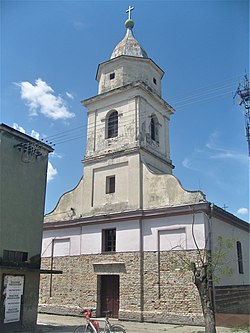Hetin
Hetin
| |
|---|---|
 The Holy Trinity Catholic Church | |
| Coordinates: 45°33′20″N 20°41′24″E / 45.55556°N 20.69000°E | |
| Country | Serbia |
| Province | Vojvodina |
| District | Central Banat |
| Elevation | 65 m (213 ft) |
| Population (2002) | |
• Hetin | 763 |
| Time zone | UTC+1 (CET) |
| • Summer (DST) | UTC+2 (CEST) |
| Postal code | 23235 |
| Area code | +381(0)23 |
| Car plates | ZR |
Hetin (Serbian Cyrillic: Хетин; Template:Lang-hu or Hetény; Template:Lang-de or Tomsdorf) is a village in Serbia. It is situated in the Žitište municipality, in the Central Banat District, Vojvodina province. The village has a Hungarian ethnic majority (53.21%) and its population numbering 763 people (2002 census).
Geography
The village is located near the border between Serbia and Romania. Closest neighbouring places are Srpski Itebej, Radojevo, Srpska Crnja, Vojvoda Stepa, Nova Crnja, Velike Livade, and Banatsko Karađorđevo. The postal code of the village is 23235, and the phone area code is 023 (telephone numbers in the village start with 832-).
History
Hetin was founded in 1841 by tobacco cultivators. In 1897, Hetin (Hetény) and Tamašfalva (Tamásfalva) were merged into one single village.
Demographics
Ethnic groups in the village include (2002 census):
- 406 (53.21%) Hungarians
- 306 (40.11%) Serbs
- others.
Historical population
- 1961: 2,008
- 1971: 1,604
- 1981: 1,139
- 1991: 881
- 2002: 763
Genealogical Records
- Up to 1860, filial parish of Cărpiniș.
- After 1860 filial parish of Nemačka Crnja (Srpska Crnja).
- Separate RC church books only starting 1899 (today at Zrenjanin Parish).
See also
References
- Slobodan Ćurčić, Broj stanovnika Vojvodine, Novi Sad, 1996.



